|
|
|
Sort Order |
|
|
|
Items / Page
|
|
|
|
|
|
|
| Srl | Item |
| 1 |
ID:
181823
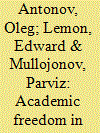

|
|
|
|
|
| Summary/Abstract |
While there have been a number of studies of the political economy of knowledge production in Central Asia, the often exploitative relations between foreign and local researcher, there has been less discussion of what Elizabeth Perry recently described as the ‘scholar–state’ nexus: how authoritarian rule rests on the suppression of independent academics, the ‘educated acquiescence’ of academia or their incorporation into the ‘factory of answers’. Through the concepts of suppression, acquiescence and incorporation, this article examines how restrictions on academic freedom have an impact on knowledge production in Tajikistan.
|
|
|
|
|
|
|
|
|
|
|
|
|
|
|
|
| 2 |
ID:
181818
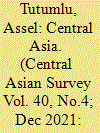

|
|
|
|
|
| Summary/Abstract |
This article answers the question of why Central Asia studies has not contributed more fully to the study of comparative politics since the collapse of the Soviet Union. It argues that during the Soviet period, Central Asia remained a dark matter to Western scholars specializing in Sovietology and who lacked access to the region. Although in the 1990s Western academics saw the ‘light at the end of the tunnel’, expecting Central Asia to join the liberal world order, these hopes declined after the 2000s when not only the transition paradigm failed, but also because a consolidated form of authoritarianism closed access to the field. In conclusion, this article offers the most promising fields for the development of the study of comparative politics across and inside Central Asia.
|
|
|
|
|
|
|
|
|
|
|
|
|
|
|
|
| 3 |
ID:
181816
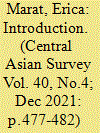

|
|
|
|
|
| Summary/Abstract |
In the last 30 years since the advent of independence, the field of Central Asian studies has become more diverse and new generations of scholars have emerged. This issue assembles seven articles by 10 authors who represent the field at large. In addition to embracing the growing field, the authors critique what they view as remaining misinterpretations or omissions in their respective disciplines. Exciting innovations for understanding Central Asia continue to flourish from the region as well as in collaboration with international partners. The coming decade is a turning point for the Central Asian studies – a time to host spirited debates and explore experimental approaches, new theories and topics.
|
|
|
|
|
|
|
|
|
|
|
|
|
|
|
|
| 4 |
ID:
181820
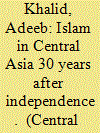

|
|
|
|
|
| Summary/Abstract |
The study of Islam in Central Asia has undergone enormous transformations in the 30 years since the Soviet era came to an end. Over the last three decades, a sizable corpus of literature on Islam in Central Asia has appeared across several disciplines. There has also been considerable debate over methods and approach: What questions are important to ask? Which kinds of sources are the most significant? Which voices from among Central Asians are the most important? This study has two main aims. First, it provides an overview of the various literatures on Islam in Central Asia, with a sense of their trajectories in the three decades since the dissolution of the Soviet Union. Second, and more importantly, it offers a critique of the critique mentioned above. The study does so by examining the ideological and methodological assumptions that underpin it and by articulating the stakes involved, a task that has not yet been undertaken.
|
|
|
|
|
|
|
|
|
|
|
|
|
|
|
|
| 5 |
ID:
181821
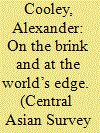

|
|
|
|
|
| Summary/Abstract |
Western scholarship on the foreign policies of the post-Soviet Central Asian states has consistently framed the region as marginalized but ripe for Great Power influence and poised to assume a more important role in world affairs. This article explores the analytical assumptions, institutional agendas, and geopolitical drivers of scholarly and policy portrayals of Central Asia, emphasizing the key role played by the Western military intervention in Afghanistan in 2001 and the region’s supporting role as logistics providers and security partners. The ensuing local and regional reactions to this intensifying securitization prompted International Relations scholars to explore the limits of Western governance and the liberal international order in Central Asia and highlight the rise of new counter-ordering norms, organizations and networks. This body of work has made important contributions to the now growing literature on post-Western International Relations, but still excludes the voices of many Central Asian scholars themselves and overlooks important regional topics and new analytical approaches.
|
|
|
|
|
|
|
|
|
|
|
|
|
|
|
|
| 6 |
ID:
181817


|
|
|
|
|
| Summary/Abstract |
The article reviews major frameworks for re-evaluating Soviet Central Asian history in anglophone scholarship after the collapse of the Soviet Union. It tackles recent popular concepts such as ‘modernity’, ‘development’ and ‘modernization’ for analysing the Soviet past in the region. It questions the analytical value of the terms as well as their ability to capture the complexity of social, political and economic changes that Central Asia underwent in the course of seven decades between the October Revolution and the dissolution of the USSR. The article furthermore provides an overview of novel themes and approaches in the field and suggests themes for further research.
|
|
|
|
|
|
|
|
|
|
|
|
|
|
|
|
| 7 |
ID:
181822


|
|
|
|
|
| Summary/Abstract |
This article surveys research on regimes and states in Central Asia and assesses its contribution to Political Science, specifically the subfield of comparative politics. It discusses three areas in which research on the region has been influenced by and, in turn, fruitfully shaped the comparative political analysis of state and regime: a turn from macro- to micro-level topics; innovations in research design; and the embrace of interdisciplinarity. It then addresses the challenges confronting scholars of the region, including uneven theoretical contributions to comparative politics and impediments in the feasibility of field research. It identifies several lively debates in comparative politics to which Central Asianists have the potential to contribute important insights. It concludes that the study of states and regimes in Central Asia has greatly enriched some debates in comparative politics (and vice versa), but declining pools of funding, the politicization of academic research, and unequal access to institutional resources among local and Western scholars threaten to diminish the field’s contributions in the coming years.
|
|
|
|
|
|
|
|
|
|
|
|
|
|
|
|
| 8 |
ID:
181819


|
|
|
|
|
| Summary/Abstract |
Recalling knowledge and instruction about Central Asia toward the end of the Cold War (1945–91) in the United States, this article provides a retrospective on an anthropologist’s coming of age and ability amidst prevailing interests and convictions concerning the region. It continues to discuss some of the early topics and studies that initiated a grounded approach to understanding Central Asia ethnographically as it broadens the analysis via a consideration of contributions from Europe and Central Eurasia. Not a literature review per se, the article focuses on some major concerns among anthropologists and their subjects since the beginning of independence. It then concludes that while studies have developed in complexity and theory within our field, we continue writing about culture via overarching political and economic systems that inform how we apprehend the world. The multiple and overlapping identities of Central Asians will continue to occupy much of our academic thinking for years to come.
|
|
|
|
|
|
|
|
|
|
|
|
|
|
|
|
|
|
|
|
|